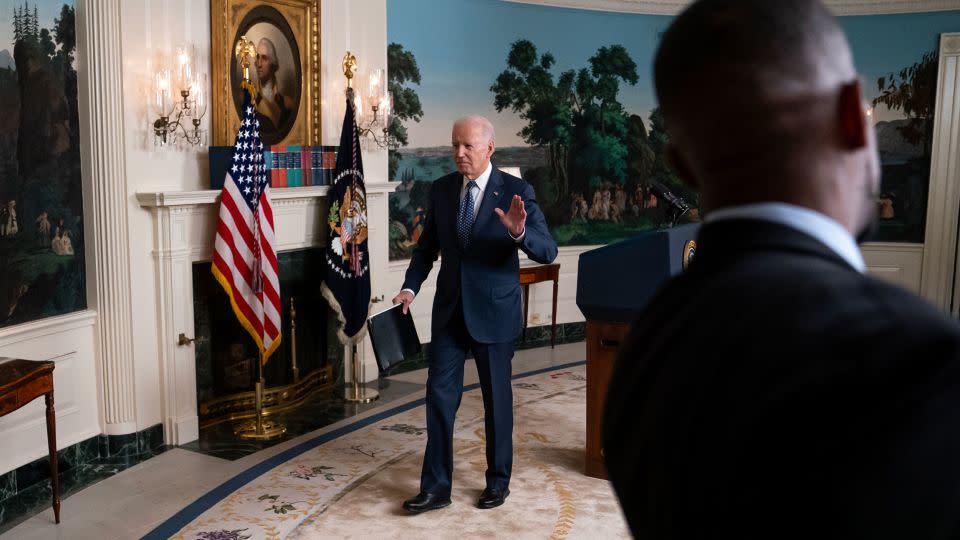Get back up to speed: Why Biden won’t be prosecuted over classified material
A version of this story appeared in CNN’s What Matters newsletter. To get it in your inbox, sign up for free here.
Special counsel Robert Hur, who spent a year investigating the discovery of classified material at President Joe Biden’s former office and Delaware home, is back in the news.
The White House, citing executive privilege, has refused to hand over to House Republicans recordings of Biden talking with Hur as well as with his ghostwriter. Transcripts of Biden’s deposition by Hur have already been released. Still, Republicans on Capitol Hill are moving to hold Attorney General Merrick Garland in contempt of Congress for not complying with subpoenas for the recordings.
Hur’s key recommendation – that Biden not be prosecuted for his handling of material when he was a private citizen – was overshadowed when Hur released his report in February because the special counsel described the president as a sympathetic elderly man with memory problems. Biden fired back against Hur’s note that he was not charged in part because a jury could potentially see him as a “well-meaning, elderly man with a poor memory.”
“I am well-meaning. And I’m an elderly man. And I know what the hell I’m doing,” Biden said.
Here’s more on Hur, his report and the fallout:
Who is Robert Hur?
Hur was appointed by then-President Donald Trump as US attorney in Maryland in 2017. During his tenure as a federal prosecutor, which ended in 2021, he prosecuted Baltimore’s then-mayor, Catherine Pugh, in a scandal involving sales of her children’s book.
In 2023, Hur was brought back from private practice and appointed to investigate the discovery of classified material at Biden’s former office and Delaware home by Garland. The selection of a Trump-appointed former US attorney was meant to help inoculate the inquiry from allegations of political influence.
What did Hur find?
Hur issued a 345-page report in February, 15 months after classified material was first found in Biden’s former office. Although investigators found material with classified markings and classified material within Biden’s private notebooks, Hur concluded the “evidence is not strong enough to establish Mr. Biden’s guilt beyond a reasonable doubt.”
When did all of this happen?
For context, the material was first found in Biden’s office at a time when the handling of classified material was very much in the news because of Trump’s refusal to return classified material to the National Archives. The timeline goes something like this:
August 2022: FBI searches Mar-a-Lago, Trump’s Florida estate, as part of its yearslong effort to reclaim classified material that had been taken from the White House by the former president.
September 2022: Speaking on “60 Minutes,” Biden responds to the Trump classified documents scandal and wonders “how anyone can be that irresponsible.” These words will not age well.
November 2022: Classified material is discovered at the president’s Penn Biden Center for Diplomacy and Global Engagement office, a Washington, DC, think tank where Biden spent time after eight years in the Obama administration. The FBI opens an investigation one week later. Later that month, Jack Smith is appointed as special counsel to oversee multiple Trump-related investigations, including the one regarding classified documents.
December 2022: Biden’s personal lawyers find more classified material in his Delaware garage and inform the FBI, which dispatches agents, but does not complete a comprehensive search.
January 2023: Additional classified documents are discovered in Biden’s Delaware home by his lawyers. CNN first reports on the discovery of material at Penn Biden Center. Hur is appointed as special counsel. He’ll spend the next year conducting his investigation, which includes interviews with 147 witnesses, including Biden.

How was the material first discovered?
Biden’s personal lawyers found it. As part of an effort to move material out of the Penn Biden Center, one of his personal attorneys looked through boxes of documents found in a closet.
One box included an envelope that read “Eyes Only” for the vice president. The word “Iran” was written on the front. Biden’s lawyers called the White House counsel’s office, which called the National Archives. Within a week, the FBI had opened an investigation.
What kind of classified material did Biden have?
Most of what Hur describes has to do with US policy toward Afghanistan. Biden, as vice president, was opposed to a surge of US troops into Afghanistan in 2009. Former President Barack Obama decided to go forward with the surge anyway.
Biden wrote a memo to Obama in 2009 arguing against the surge, and both the memo and material with classified markings related to the surge were found by the FBI in an unsecured box in Biden’s Delaware garage and in his home office.
Separately, investigators found notebooks with classified material in Biden’s handwriting in his Delaware home office and den.
Is that all the classified material?
No. Additional classified material was found in November 2022 in Biden’s office near the Capitol building at the Penn Biden Center. It was actually the discovery of this material that initially set off a search for classified documents in Biden’s home.
There is not as much detail in Hur’s report on these documents, which total 44 pages sprinkled in boxes with nonclassified documents on everything from a 2011 ski trip to the Biden family genealogy.
Some documents are concerned with the Obama-era agreement to limit Iran’s pursuit of nuclear weapons. Others had to do with a phone call between Biden and Ukraine’s prime minister at the time, as well as US policy in Iraq.
Did Biden know that he had classified material?
That’s a key question since it is the “willful” mishandling of classified material as a former vice president for which Biden could have been prosecuted. Much of the classified material is in the form of handwritten notecards and notebooks, although Hur cites the actions of previous presidents, including Ronald Reagan, to say that Biden could “argue plausibly” he thought he had the ability to keep such things in his home.
While Hur documents one instance in which Biden refers to finding classified material during a conversation with the ghostwriter of one of his memoirs, other times the president skips over reading aloud things he thinks might be classified. But, according to Hur, there are moments when Biden does read nearly verbatim classified material to his ghostwriter, Mark Zwonitzer.
How do we know what exactly Biden told his ghostwriter?
Zwonitzer recorded and transcribed their conversations. In fact, after he learned of the appointment of Hur as special counsel, Zwonitzer deleted the recordings, although he kept the transcripts and gave them to the FBI. The FBI was ultimately able to retrieve the deleted recordings.
Hur considered prosecuting Zwonitzer with obstruction for deleting the recordings but ultimately decided there would not be enough evidence to obtain a conviction.

Why did Hur decide not to prosecute Biden?
Hur concludes that Biden “willfully” retained classified material, but also that there is not enough evidence to establish Biden’s guilt beyond a reasonable doubt.
There are a variety of reasons for this conclusion. For starters, Hur notes that by quickly notifying the government after the documents were discovered, some jurors would be convinced the president made an innocent mistake.
Plus, there are the aforementioned problems with Biden’s memory, both when he was interviewed by the special counsel and during his interactions with Zwonitzer.
Hur concludes that even if Department of Justice policies allowed for the prosecution of a sitting president, he would recommend against prosecuting Biden.
Why is Trump being prosecuted for mishandling classified data while Biden is not?
Hur explains this in his report, arguing there are important distinctions between the two cases and “aggravating facts” in the case of Trump.
From Hur’s report:
Most notably, after being given multiple chances to return classified documents and avoid prosecution, Mr. Trump allegedly did the opposite. According to the indictment, he not only refused to return the documents for many months, but he also obstructed justice by enlisting others to destroy evidence and then to lie about it. In contrast, Mr. Biden turned in classified documents to the National Archives and the Department of Justice, consented to the search of multiple locations including his homes, sat for a voluntary interview. and in other ways cooperated with the investigation.
Will that kind of explanation from a special counsel satisfy Republicans who routinely allege a double standard at the Department of Justice? It will not.
This story has been updated with additional information.
For more CNN news and newsletters create an account at CNN.com


